Solar Taxes && Policy: Impact on Renewable Sector - Rajya Sabha Debate
By Rediff Money Desk, New Delhi Aug 05, 2024 17:41
Opposition MPs in Rajya Sabha raise concerns about high GST, policy inconsistencies and lack of support for solar energy development in India, citing slow progress in renewable energy targets.
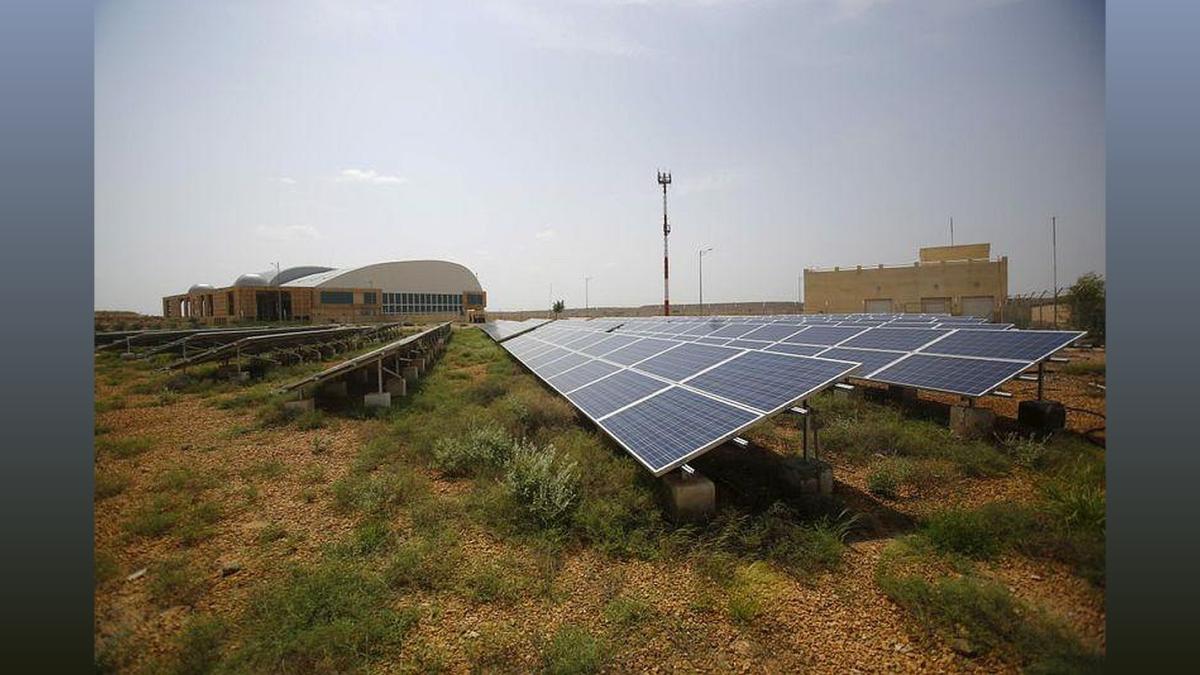
New Delhi, Aug 5 (PTI) Opposition members in the Rajya Sabha on Monday said the high GST rate and inconsistency in the tax regime are adversely impacting renewable energy capacity addition in the country.
During discussions on the working of the Ministry of New & Renewable Energy and Power Ministry, Congress member Ranjeet Ranjan said the government has increased GST on solar energy equipment to 12 per cent from 5 per cent, which should be made nil to encourage people to procure solar power equipment.
"Under the Paris Agreement, the target is to add 500 GW of renewable energy, and we have reached 200 GW at present. To achieve 500 GW, you need to add 50 GW every year. In reality, you are able to make 15 GW that too after combining solar, hydro, wind and biogas. There is no answer to how you will reach 50 GW," she said.
She said that the government is levying interest at the market rate on consumers under PM Surya Ghar Muft Bijlee Yojana.
"In reality PM Surya Ghar Muft Bijlee Yojana is a lollipop. It is not practical for the common man because, besides metering fees, you are charging 7 per cent interest. I demand that at least 7 per cent interest should be brought to zero," Ranjan said.
She said that 1 kilowatt of solar energy is costing Rs 50,000-60,000.
"Out of Rs 1.5 lakh you are giving subsidy on 78,000 and Rs 72,000, you are charging 7 per cent interest, which is market rate. First, what is a free scheme then? This is not a free scheme," the member added.
Ranjan mentioned the alleged inconsistency in the permission granted to renewable energy developers.
"You grant a developer permit of 25 years and renew it every five years. In the first five years, you ask them to produce 100 GW. Various complaints have come that when they come for renewal, you reduce their permit to 50 GW. I doubt that it is happening with small developers only to give business to big players," she said.
The Congress member told the finance minister in February 2020 had announced that solar power capacity will be set up alongside rail tracks, which will use 51,000 hectares of unused railway land on the sides of railway tracks, having the capacity to produce 10 gigawatt of clean energy.
"Where is that project? Have you even generated 2 GW?" she quipped.
YSR Congress Party member S Niranjan Reddy lauded the increase in allocation for the ministry by 147.29 per cent to Rs 18,254 crore from 7,620 crore.
He said India needs Rs 30 lakh crore investment by 2030 and Niti Aayog has estimated that if India wants to stay on its target to achieve net zero by 2070, then an investment of USD 10 trillion will be required.
Reddy said that almost 90 per cent of the investment needs to come from the private sector, and the government's focus needs to be that an ecosystem be created on the private side to come and make investments.
"This would happen if tariffs are reasonable if the amounts are paid on time. It may not be the only responsibility of the Union government. All states, which we represent here, have to go hand in hand with the Centre for ensuring that we give confidence to people who come and invest in green finance," Reddy said.
He said that with AI coming into modern data centres, it will need a lot of energy.
"India would have to walk a delicate path where it may need to nudge most of these modern digital power consumer agencies toward green energy consumption," Reddy said.
He said that data centres need to be given certain milestones under energy conservation so that they start incrementally increasing their power requirement from green energy sources.
AAP member Sandeep Kumar Pathak said there is no consistency in tax policy for the renewable sector.
He said that sometime back import duty was increased with the hope to increase manufacturing, and a year later, it was reduced.
"If someone makes a new project. It takes at least two years for a project to materialise, and you change your rule in a year. This inconsistency will lead to nowhere," he said.
Pathak said India has 90 players and only 2-3 big players and this needs to expand like China, which has around 2,000 players.
He noted that the government needs to work on skilled manpower for repairing solar panels.
DMK Kanimozhi NVN Somu also participated in the discussion.
During discussions on the working of the Ministry of New & Renewable Energy and Power Ministry, Congress member Ranjeet Ranjan said the government has increased GST on solar energy equipment to 12 per cent from 5 per cent, which should be made nil to encourage people to procure solar power equipment.
"Under the Paris Agreement, the target is to add 500 GW of renewable energy, and we have reached 200 GW at present. To achieve 500 GW, you need to add 50 GW every year. In reality, you are able to make 15 GW that too after combining solar, hydro, wind and biogas. There is no answer to how you will reach 50 GW," she said.
She said that the government is levying interest at the market rate on consumers under PM Surya Ghar Muft Bijlee Yojana.
"In reality PM Surya Ghar Muft Bijlee Yojana is a lollipop. It is not practical for the common man because, besides metering fees, you are charging 7 per cent interest. I demand that at least 7 per cent interest should be brought to zero," Ranjan said.
She said that 1 kilowatt of solar energy is costing Rs 50,000-60,000.
"Out of Rs 1.5 lakh you are giving subsidy on 78,000 and Rs 72,000, you are charging 7 per cent interest, which is market rate. First, what is a free scheme then? This is not a free scheme," the member added.
Ranjan mentioned the alleged inconsistency in the permission granted to renewable energy developers.
"You grant a developer permit of 25 years and renew it every five years. In the first five years, you ask them to produce 100 GW. Various complaints have come that when they come for renewal, you reduce their permit to 50 GW. I doubt that it is happening with small developers only to give business to big players," she said.
The Congress member told the finance minister in February 2020 had announced that solar power capacity will be set up alongside rail tracks, which will use 51,000 hectares of unused railway land on the sides of railway tracks, having the capacity to produce 10 gigawatt of clean energy.
"Where is that project? Have you even generated 2 GW?" she quipped.
YSR Congress Party member S Niranjan Reddy lauded the increase in allocation for the ministry by 147.29 per cent to Rs 18,254 crore from 7,620 crore.
He said India needs Rs 30 lakh crore investment by 2030 and Niti Aayog has estimated that if India wants to stay on its target to achieve net zero by 2070, then an investment of USD 10 trillion will be required.
Reddy said that almost 90 per cent of the investment needs to come from the private sector, and the government's focus needs to be that an ecosystem be created on the private side to come and make investments.
"This would happen if tariffs are reasonable if the amounts are paid on time. It may not be the only responsibility of the Union government. All states, which we represent here, have to go hand in hand with the Centre for ensuring that we give confidence to people who come and invest in green finance," Reddy said.
He said that with AI coming into modern data centres, it will need a lot of energy.
"India would have to walk a delicate path where it may need to nudge most of these modern digital power consumer agencies toward green energy consumption," Reddy said.
He said that data centres need to be given certain milestones under energy conservation so that they start incrementally increasing their power requirement from green energy sources.
AAP member Sandeep Kumar Pathak said there is no consistency in tax policy for the renewable sector.
He said that sometime back import duty was increased with the hope to increase manufacturing, and a year later, it was reduced.
"If someone makes a new project. It takes at least two years for a project to materialise, and you change your rule in a year. This inconsistency will lead to nowhere," he said.
Pathak said India has 90 players and only 2-3 big players and this needs to expand like China, which has around 2,000 players.
He noted that the government needs to work on skilled manpower for repairing solar panels.
DMK Kanimozhi NVN Somu also participated in the discussion.
Source: PTI
Read More On:
DISCLAIMER - This article is from a syndicated feed. The original source is responsible for accuracy, views & content ownership. Views expressed may not reflect those of rediff.com India Limited.
You May Like To Read
TODAY'S MOST TRADED COMPANIES
- Company Name
- Price
- Volume
- Vodafone Idea L
- 7.37 ( -3.91)
- 45380504
- Srestha Finvest
- 0.70 (+ 2.94)
- 40913718
- Suzlon Energy Ltd.
- 54.08 ( -8.94)
- 33065383
- Spicejet Ltd.
- 53.63 ( -6.60)
- 15164993
- GTL Infrastructure
- 2.03 ( -3.79)
- 14761553
MORE NEWS

India's Workforce to Reach 457.62 Million by...
India's workforce is projected to increase to 457.62 million by 2028, driven by...

Sensex Slumps 984 Points: Banking, Auto Drag...
Indian stock market closes at 4-month low on Wednesday, led by declines in banking and...
Indowind Energy Profit Down 11% in Q2 FY25
Indowind Energy's net profit fell 11% to Rs 4.41 crore in Q2 FY25, while revenue...



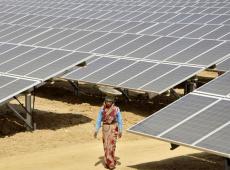
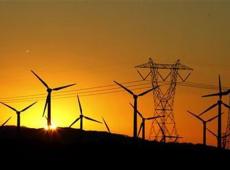
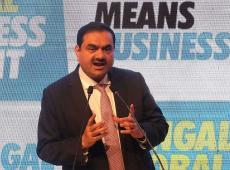
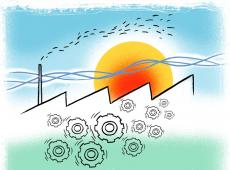
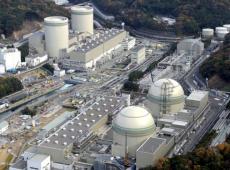



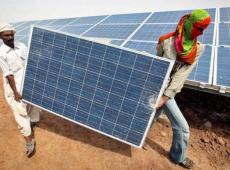
 © 2024 Rediff.com India Limited. All rights reserved.
© 2024 Rediff.com India Limited. All rights reserved.